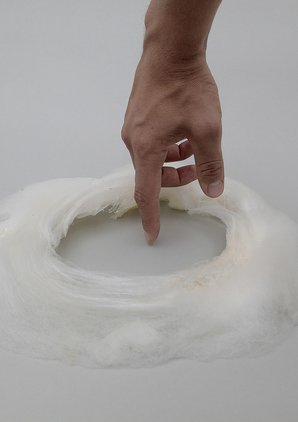Abendvorträge im Rahmen der Ph.D.-Lehrwoche
Im Rahmen der zweiten Ph.D.-Lehrwoche im Wintersemester 2019/19 finden wieder Abendvorträge statt, zu denen Interessierte eingeladen sind. Darunter die Antrittsvorlesung von Prof. Dr. (Jun.-Prof.) Alexandra Toland unter dem Titel »Seeds as Boundary Objects of the Anthropocene«.
Antrittsvorlesung Prof. Dr. (Jun.-Prof.) Alexandra Toland:
»Seeds as Boundary Objects of the Anthropocene«
Zeit:
Montag, 28. Januar 2019, 19 Uhr
Ort:
ACC Galerie Weimar
Burgplatz 1
99423 Weimar
im Rahmen der »Monday Night Lecture Series« in Kooperation mit dem M.F.A.-Programm »Public Art and New Artistic Strategies«
In this performance / lecture, the new Junior Professor for arts and research, Prof. Dr. (Jun. Prof.) Alexadra Toland (Faculty of Art and Design, Bauhaus Universität Weimar), will explore seeds as an example of boundary objects of the Anthropocene. Boundary objects, according to Science Technology Society scholars Susan Leigh Star and James Griesemer (1989), are conceptual entities that bridge different understandings of information by different user groups. For artists, the “objectness” of Star and Griesemer’s approach provides a flexible, tangible, and highly affective instrument for interdisciplinary research practice. In the context of the Anthropocene, the present geologic era marked by human activity, seeds become a means of symbolic depiction; a meme for political activism against industrial agriculture; a sign of hope for food security scientists; as well as a poetic idea that can galvinize different communities to imagine new strategies of resiliance and reconcilliation in a time of great uncertainty. The performance / lecture will be held in English.
Über Alexandra Toland:
Alexandra Toland is a visual artist and environmental planner with research interests in ecosystem services, urban ecology, soil and culture, and the Anthropocene. She began a Junior Professorship for Arts and Research at the Bauhaus University of Weimar in April 2018 and currently directs the ¬PhD Programme in Art and Design. She received her PhD in landscape planning from the Technische Universität Berlin, Institute of Ecology, and has lectured at the University of Arts Berlin (UDK), Humboldt Universität zu Berlin, and Leuphana University. She co-chaired the German Soil Science Society’s Commission on Soils in Education and Society from 2011 to 2015, and has published widely on the topic of soil and art. Her work has been exhibited at the Prix Ars Electronica, Museum Schloß Moyland, Art Laboratory Berlin, German Hygiene Museum (upcoming), Botanical Garden Ljubljana, and Taliesin School of Architecture.
Abendvortrag von Jannis Hülsen, Stefan Schwabe und Clemens Winkler:
»The Vague Space«
Zeit:
Mittwoch, 30. Januar 2019, 19 Uhr
Ort:
Fakultät Kunst und Gestaltung
Van-de-Velde-Werkstatt, Raum 116
Geschwister-Scholl-Straße 7
99423 Weimar
»In search of an image and material based language for the space in which words stumble and fall.
A way of playing - allowing to be unknowing. Giving way to be surprised.
Ingredients such as: the material and the immaterial, the abstract and the concrete, the living,
the inanimate; with words, with matter; with the process.
Learning by playing and to play, by rules the game imposes onto itself.
Artefacts of various processes, re-excavated and re-purposed as new beginnings.«
Katharina Ludwig
The Vague Space ist ein Vorschlag für die Bezeichnung eines Raums, der im Kontrast steht zu all dem, was wir als definiert und konkret kennen. Der Ursprung der Bezeichnung liegt in den Beobachtungen von Situationen, die etwas Neues hervorbringen, sich jedoch noch nicht in Worte fassen lassen. Wir befinden uns in einem vagen Raum, in dem wir versuchen Worte zu finden und uns genauso auf die Suche nach Neuem begeben können.
Über Jannis Hülsen, Stefan Schwabe und Clemens Winkler:
Stefan Schwabe und Jannis Hülsen sind aktuell als Initiatoren und Koordinaten für das Forschungsprojekt »Farming the Uncanny Valley« an der UdK Berlin tätig. In diesem Projekt entwickeln sie Formate zur Partizipation und Kommunikation zum Thema Biotechnologie. Ein Fokus ihrer Arbeit liegt im Perspektivwechsel zwischen händischen Experimenten und theoretischer Reflexion. Dabei beschäftigen sie sich mit der Dynamik in der persönlichen Konfrontation mit dem Unbekannten und der Entstehung des ›Neuen‹. Im Wintersemester 2017/2018 waren sie gemeinsam Gastprofessoren an der Burg Giebichenstein Kunsthochschule Halle. Stefan Schwabe studierte and der Burg Giebichenstein Kunsthochschule Halle und am Royal College of Art, Jannis Hülsen studierte an der Hochschule für Bildende Künste Braunschweig.
Clemens Winkler’s Arbeit beschäftigt sich mit Wegen der Artikulation und Mediation, vor allem in der Erzeugung und dem Wiederbeleben von Material-basierter Sprache. Neben selbstständigen Projekten, trat er 2013 dem Interaction Design Team und der Enactive Environments Gruppe an der Zürcher Hochschule der Künste als wissenschaftlicher Mitarbeiter und Dozierender bei. Er ist auch Gastdozent im Fachgebiet Material Futures am Central Saint Martins College London. Zuvor studierte er an den MIT Media Labs in Boston und dem Royal College of Art, London.



